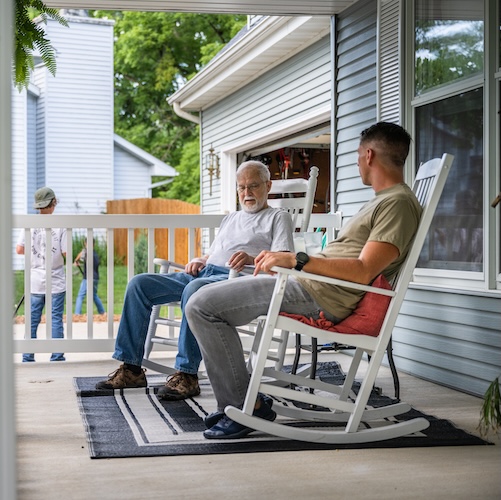Am I better off financially than my parents were?
Feb 24, 2024
•5-minute read
- 78% of Americans feel that they’re doing financially OK or living comfortably, while 22% are just getting by or finding it difficult to get by.
- 57% of Americans say they are doing better financially than their parents were at the same age.
- 62% of Americans with a mortgage believe they are better off than their parents were at the same age, compared to 46% of renters.
According to the T. Rowe Price 2021 Parents, Kids, And Money Survey, 54% of parents say they frequently have conversations with their children about setting financial goals. These types of conversations can make a lasting impression on children, helping them become aware of the importance of proper money management.
As children become adults, they might start to compare how they are doing financially to how their parents were doing financially at the same age.
We decided to take a look at the Survey of Household Economics and Decision Making (SHED) to see how Americans feel they are doing financially compared to their parents.
Perceptions of financial success
Financial success isn’t the same for everyone, and comparing your financial state with someone else’s isn’t the best way to measure your own success. For example, at age 27, you might be single and living on your own while your parents at 27 might’ve been married, had two children and owned a house.
There are so many factors involved in each financial situation described here. Maybe at 27, you have student loan debt that prevents you from being able to afford a house. On the other hand, maybe your parents inherited a business at 27, which provided them with stable income and the ability to afford to buy a home and have children.
According to the Survey of Household Economics and Decision Making (SHED), 57% of Americans say they are doing better financially than their parents were at the same age. In terms of gender, women of all generations were more likely than men to feel they are worse off than their parents were at the same age.
Overall, 53% of millennials say they are financially better off than their parents were at their age, but why do they feel this way? With birth rates steadily declining over the past several years (except for a slight 1% increase in 2021), it could be that millennial couples are either not having children right now or not planning to have them at all. Perhaps this suggests that parents of millennials were most likely having children at their age, meaning they might’ve had less money due to those extra expenses. If millennials today are not having children right now, this means they are able to keep most of their income, leading to an increased satisfaction with their finances.
This survey also shows some of the financial benefits that may come along with marriage, as 60% of married millennials were more likely than single millennials (46%) to say they are doing better financially than their parents.
Is homeownership a sign of financial success?
While homeownership isn’t the picture of financial success for everyone, there are strong relationships between homeownership and perceptions of financial success. For example, 62% of Americans with a mortgage feel they’re better off than their parents were at the same age, while only 46% of renters feel the same.
Though financial success is subjective, many Americans do deem buying a home – often the largest purchase of their lives – as one of their highest achievements. In fact, one study by the National Association of REALTORS® found that 74% of Americans described homeownership as the “highest gauge of prosperity.” Homeownership was the highest percentage, with over 66% valuing retirement and 60% a successful career as their highest measure of financial success.
Financial well-being
Figuring out where you stand financially is important to know as you move and grow through life. Financial wellness can be tough to achieve, especially with the never-ending cycle of bills, student loans, car payments and other expenses, but it’s essential to take a step back and ask yourself, “How am I doing financially?” Before you begin your self-evaluation, you should understand the components of financial wellness. Here are four:
- Financial stability: You have a steady and reliable income and feel comfortable and confident in your financial situation.
- Emergency fund: You have at least 3 months of expenses saved to cover emergencies or a loss of income.
- Progress toward financial goals: You have clear financial goals and are making strides toward achieving them (buying a house, retirement, etc.)
- Financial flexibility: You have the flexibility to afford nonessential activities like vacations, concerts or any other elective expense that makes you happy.
So how do Americans feel about their own financial well-being? Based on the graphic below, we see that 78% of Americans feel that they’re doing financially OK or living comfortably. On the other hand, 22% are just getting by or finding it difficult to get by.
What’s more notable is that 32% of Americans who feel they’re better off than their parents – and 59% who feel worse off – don’t have 3 months of expenses saved. Yet, having an emergency fund is a key factor in overall financial well-being. Not only can it help you feel more secure, but it can also help you keep progressing towards major financial goals – like buying a house.
For example, a savings account with 3 or more months’ worth of expenses is particularly impactful for prospective or first-time home buyers. More money in savings can allow you to pay down debts, which can lead to a better credit score and a greater likelihood of getting approved for a mortgage. In addition, it can help buyers make a larger down payment, lower monthly mortgage payments and even increase how much house you can afford. For homeowners, 3 months’ worth of savings can come in handy when your home needs a new roof or HVAC system unexpectedly.
The bottom line
How you’re doing financially compared to your parents at the same age is highly subjective and depends on a number of factors, like your personal perception of financial success and economic conditions. No matter your financial goals, making progress toward them is something to be proud of. Whether you’re simply building your savings account, saving up for retirement or applying for a mortgage, do your research into the true costs and benefits of the purchase.
If buying a house is your top financial goal, learn more about how much money you need to buy a house and other financial requirements to meet before getting approved for a mortgage.
Methodology and limitations
Data was collected from the Federal Reserve Board’s 2021 Survey of Household Economics and Decision Making (SHED). The survey includes responses from over 11,000 individuals collected in October and November 2021. You can read more about the survey methods and limitations on the Federal Reserve Board’s website.
All results were weighted by the field weight_p. Cross-tabs were calculated for each variable or set of variables and a “weight” value was consistently applied to all responses.
The following fields from the raw survey results were included in our analysis:
- A6
- B2
- B6
- EF1
- EF3_H
- PPAGE
- GH1
- PPGENDER
- PPMARIT5
- PPStateN
- Weight_P
To determine generations, the following ages were grouped together:
- Baby boomer: Persons with an age greater than 57 and less than or equal to 76
- Generation X: Persons with an age greater than 42 and less than or equal to 57
- Millennial: Persons with an age greater than or equal to 26 and less than or equal to 42

Miranda Crace
Miranda Crace is a Senior Section Editor for the Rocket Companies, bringing a wealth of knowledge about mortgages, personal finance, real estate, and personal loans for over 10 years. Miranda is dedicated to advancing financial literacy and empowering individuals to achieve their financial and homeownership goals. She graduated from Wayne State University where she studied PR Writing, Film Production, and Film Editing. Her creative talents shine through her contributions to the popular video series "Home Lore" and "The Red Desk," which were nominated for the prestigious Shorty Awards. In her spare time, Miranda enjoys traveling, actively engages in the entrepreneurial community, and savors a perfectly brewed cup of coffee.
Related resources

6-minute read
A complete guide to property tax benefits for veterans
Do veterans pay property taxes? It depends on where you live and your disability status. Learn more with the Rocket Mortgage guide.
Read more

5-minute read
What is home appreciation and how is it calculated?
Learn how the value of your home or investment property may be increasing over time, resulting in equity while you own it and profits when you sell it.
Read more

7-minute read
How much does it cost to renovate a house?
The amount it costs to remodel a house can vary depending on the scale of the project. Learn the average costs associated with various kinds of remodels.
Read more